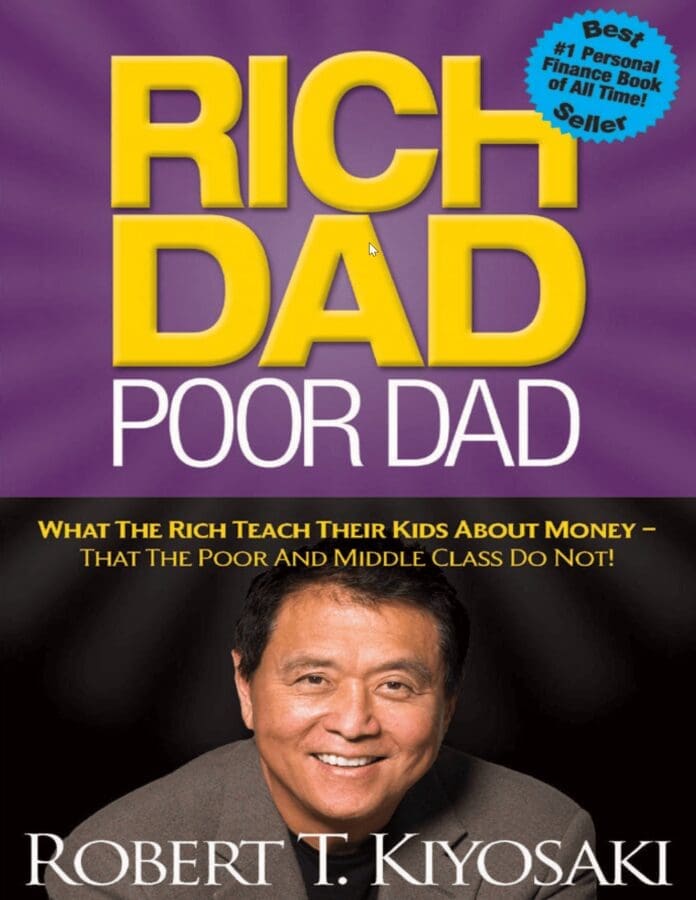“Rich Dad Poor Dad” by Robert T. Kiyosaki has enjoyed significant popularity since its publication, positioning itself as a cornerstone of personal finance literature. However, despite its widespread acclaim, a critical examination reveals several fundamental flaws in both its content and delivery.
Simplistic Dichotomy and Anecdotal Evidence
At the core of “Rich Dad Poor Dad” is the juxtaposition between the financial philosophies of Kiyosaki’s two father figures: his own educated but financially struggling biological father (“Poor Dad”) and the father of his best friend who is portrayed as a shrewd, wealthy businessman (“Rich Dad”). While this narrative device is compelling in its simplicity, it ultimately fails to account for the nuanced realities of financial success and education.
Kiyosaki’s reliance on anecdotal evidence to draw broad conclusions about financial literacy is particularly problematic. The experiences of two individuals are insufficient to substantiate sweeping generalizations about wealth, education, and financial success. This anecdotal approach oversimplifies complex socioeconomic issues, reducing them to binary choices that do not reflect the multifaceted nature of real-world financial dynamics.
Questionable Financial Advice
One of the most contentious aspects of “Rich Dad Poor Dad” is the financial advice it espouses. Kiyosaki’s recommendations often veer into risky territory, advocating for strategies that may not be suitable for the average reader. For example, his promotion of real estate investments and entrepreneurship, while potentially lucrative, glosses over the inherent risks and challenges associated with these ventures.
Moreover, Kiyosaki’s disdain for traditional employment and formal education undermines the value of stability and security that these pathways can offer. His assertion that “the rich don’t work for money” is misleading and fails to acknowledge that many wealthy individuals have achieved their status through hard work and strategic career choices within traditional employment frameworks.
Lack of Empirical Support
The book’s lack of empirical support further weakens its credibility. Kiyosaki’s claims are rarely backed by data or research, relying instead on personal anecdotes and generalizations. This absence of empirical evidence makes it difficult to evaluate the validity of his assertions and leaves readers without a solid foundation on which to base their financial decisions.
For instance, Kiyosaki’s emphasis on the importance of financial education is well-founded, but his specific recommendations for achieving financial literacy lack substantiation. The book would benefit from references to studies, statistics, and expert opinions that could lend credibility to its arguments and provide readers with a more robust understanding of personal finance.
Ethical Concerns and Controversial Practices
Kiyosaki’s promotion of network marketing and other controversial business practices raises ethical concerns. His endorsement of these schemes, which often border on pyramid structures, is troubling given their potential to exploit vulnerable individuals seeking financial independence. The emphasis on aggressive sales tactics and recruitment can lead to significant financial losses for participants, contradicting the book’s purported goal of promoting financial empowerment.
Additionally, Kiyosaki’s own business ventures, including his Cashflow board game and various seminars, have faced criticism for prioritizing profit over genuine financial education. These ventures often charge exorbitant fees and offer limited practical value, calling into question the author’s commitment to the financial well-being of his audience.
Overemphasis on Wealth Accumulation
“Rich Dad Poor Dad” places a disproportionate emphasis on wealth accumulation as the primary measure of success. This focus on material wealth neglects other important aspects of financial well-being, such as security, stability, and ethical considerations. Kiyosaki’s mantra that “money is power” overlooks the intrinsic value of financial security and the peace of mind that comes from prudent financial management.
Furthermore, the book’s portrayal of financial success as an individual pursuit disregards the broader societal and structural factors that influence economic mobility. By framing wealth accumulation as solely a matter of personal choice and effort, Kiyosaki ignores the systemic barriers that many individuals face, such as discrimination, lack of access to quality education, and economic inequality.
Inconsistent and Contradictory Messages
Throughout “Rich Dad Poor Dad,” Kiyosaki often delivers inconsistent and contradictory messages. While he advocates for financial independence and self-reliance, he also suggests leveraging debt and taking significant financial risks, which can undermine long-term stability. This inconsistency can confuse readers and lead to misguided financial decisions.
For example, Kiyosaki’s advice to avoid liabilities and focus on acquiring assets is sound in theory, but his definition of assets is overly broad and sometimes misleading. By categorizing investments like real estate and businesses as unequivocally positive assets, he fails to account for the potential downsides and financial burdens these investments can entail.
Conclusion
“Rich Dad Poor Dad” has undoubtedly inspired many individuals to take control of their financial futures and seek greater financial literacy. However, its simplistic dichotomies, questionable financial advice, lack of empirical support, ethical concerns, overemphasis on wealth accumulation, and inconsistent messages diminish its overall value as a personal finance guide.
While the book’s core message of financial education and empowerment is important, readers should approach its content with a critical eye and seek additional sources of information and advice. True financial success requires a balanced understanding of risk, stability, and ethical considerations, which “Rich Dad Poor Dad” often overlooks in its pursuit of wealth.

